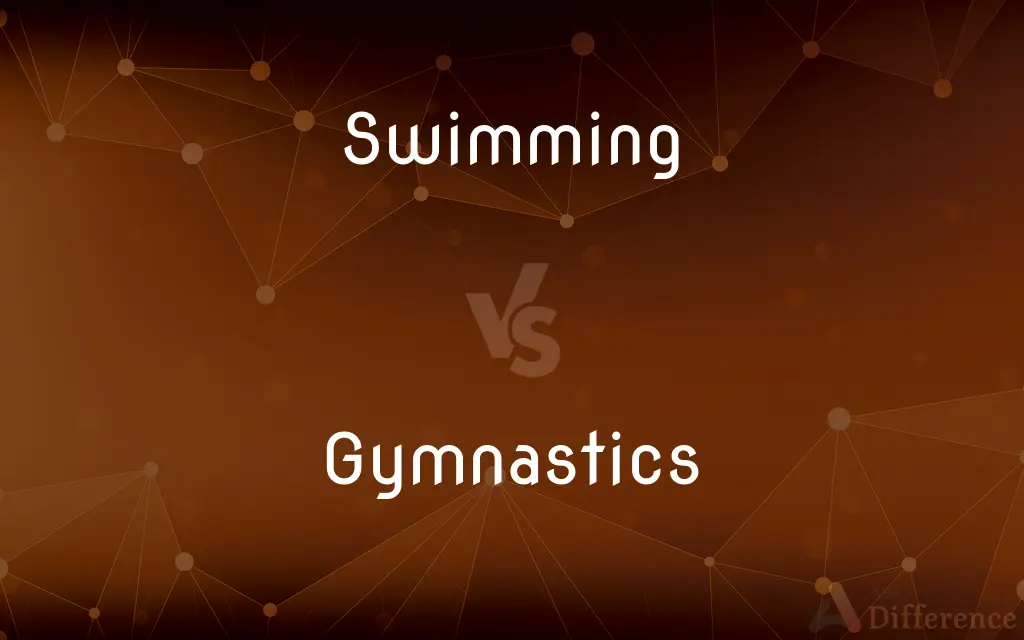Swimming vs. Gymnastics — What's the Difference?
By Tayyaba Rehman & Fiza Rafique — Updated on May 10, 2024
Swimming primarily focuses on exercises in water, enhancing cardiovascular health; gymnastics involves body movements to develop flexibility and strength.

Difference Between Swimming and Gymnastics
Table of Contents
ADVERTISEMENT
Key Differences
Swimming is an aquatic sport that relies on various strokes to move through water, utilizing nearly all major muscle groups. Gymnastics, on the other hand, is a discipline that emphasizes body control, balance, and flexibility, requiring athletes to perform routines on different apparatus.
In swimming, athletes compete in pools with the objective of completing set distances in the shortest time. Whereas in gymnastics, competitors perform predefined routines judged on execution, difficulty, and artistic impression.
The training for swimming primarily builds endurance and cardiovascular fitness, with a significant focus on lung capacity and stamina. Gymnastics training, however, concentrates more on muscular strength, agility, and coordination.
The risk of injury in swimming is generally related to overuse, particularly in shoulders and knees. Conversely, gymnastics poses a higher risk of acute injuries due to falls and the high-impact nature of the routines.
Equipment for swimming is minimal, typically requiring only a swimsuit, goggles, and a cap. On the other hand, gymnastics requires various apparatus like bars, beams, and mats, in addition to specialized attire for safety and performance.
ADVERTISEMENT
Comparison Chart
Primary Focus
Cardiovascular health, endurance
Flexibility, strength, body control
Competition Format
Races in pools based on time
Routines judged on multiple criteria
Training Focus
Endurance, lung capacity
Strength, agility, coordination
Common Injuries
Overuse injuries (shoulders, knees)
Acute injuries (falls, impacts)
Equipment Needed
Swimsuit, goggles, cap
Bars, beams, mats, specialized attire
Compare with Definitions
Swimming
A method of moving in water, done by using one's body.
Freestyle is the fastest method of swimming.
Gymnastics
The practice of physical exercises designed to develop physical skills and grace.
She practices gymnastics to enhance her body coordination.
Swimming
The act of a person or thing that swims.
Swimming in the ocean is more challenging due to the currents.
Gymnastics
Physical exercises performed to develop strength and coordination.
The gymnastics team trains rigorously to perfect their routines.
Swimming
The skill or technique of someone who swims.
His swimming has improved dramatically since joining the club.
Gymnastics
The art or sport of performance that displays feats of balance and agility.
His routine in gymnastics impressed all the judges.
Swimming
The sport of racing in water.
Swimming competitions are held at various levels from local to international.
Gymnastics
A sport involving exercises intended to display strength and balance.
Gymnastics requires athletes to be extremely flexible.
Swimming
A sport or activity of moving through water by using the limbs.
She took up swimming to improve her overall fitness.
Gymnastics
A competitive sport requiring routines on various apparatus.
Gymnastics competitions can be mesmerizing to watch.
Swimming
Swimming is the self-propulsion of a person through water, or a liquid substance, usually for recreation, sport, exercise, or survival. Locomotion is achieved through coordinated movement of the limbs and the body.
Gymnastics
Gymnastics is a sport that includes physical exercises requiring balance, strength, flexibility, agility, coordination, and endurance. The movements involved in gymnastics contribute to the development of the arms, legs, shoulders, back, chest, and abdominal muscle groups.
Swimming
The act, sport, or technique of one that swims.
Gymnastics
(used with a pl. verb) Physical exercises designed to develop and display strength, balance, and agility, especially those performed on or with specialized apparatus.
Swimming
Relating to or used in swimming.
Gymnastics
(used with a sing. verb) The art or practice of such exercises.
Swimming
That swims; capable of swimming; adapted to, or used in, swimming; as, a swimming bird; a swimming motion.
Gymnastics
Complex intellectual or artistic exercises
Mental gymnastics.
Swimming
Suffused with moisture; as, swimming eyes.
Gymnastics
(Informal) Feats of physical agility
Had to go through gymnastics to cross the slippery walk.
Swimming
Capable of swimming
Swimming insects.
Gymnastics
A sport involving the performance of sequences of movements requiring physical strength, flexibility, and kinesthetic awareness.
Gymnastics was a significant part of the physical education curriculum.
Swimming
The act or art of sustaining and propelling the body in water.
Gymnastics
Complex intellectual or artistic exercises or feats of physical agility.
His mental gymnastics are legendary.
Swimming
The state of being dizzy or in vertigo.
Gymnastics
Athletic or disciplinary exercises; the art of performing gymnastic exercises.
Swimming
Present participle of swim
Gymnastics
Disciplinary exercises for the intellect or character.
Swimming
Being in a state of vertigo or dizziness; as, a swimming brain.
Gymnastics
Feats demonstrating a quick mental agility; as, mental gymnastics, verbal gymnastics.
Swimming
The act of one who swims.
Gymnastics
A sport that involves exercises intended to display strength and balance and agility
Swimming
Vertigo; dizziness; as, a swimming in the head.
Swimming
The act of swimming
Swimming
Filled or brimming with tears;
Swimming eyes
Watery eyes
Sorrow made the eyes of many grow liquid
Swimming
Applied to a fish depicted horizontally
Common Curiosities
How does gymnastics contribute to physical health?
It enhances flexibility, strength, and coordination.
What apparatus are used in gymnastics?
Common apparatus include the balance beam, parallel bars, and floor mats.
Are swimming and gymnastics suitable for all ages?
Yes, both sports can be adapted for different age groups and skill levels.
What is the main physical benefit of swimming?
Swimming improves cardiovascular health and muscle tone across the body.
What are common injuries in gymnastics?
Common injuries include sprains, fractures, and concussions.
What is the basic equipment needed for swimming?
A swimsuit, goggles, and sometimes a cap.
How are performances judged in gymnastics?
Performances are judged based on execution, difficulty, and artistic impression.
What types of swimming strokes are there?
Main strokes include freestyle, backstroke, and butterfly.
Can swimming improve muscle strength?
Yes, it can improve overall muscle strength, particularly in the upper body.
Is water safety important in swimming?
Yes, learning and adhering to water safety rules is crucial.
Share Your Discovery

Previous Comparison
Pasture vs. Paddock
Next Comparison
Juice vs. PureeAuthor Spotlight
Written by
Tayyaba RehmanTayyaba Rehman is a distinguished writer, currently serving as a primary contributor to askdifference.com. As a researcher in semantics and etymology, Tayyaba's passion for the complexity of languages and their distinctions has found a perfect home on the platform. Tayyaba delves into the intricacies of language, distinguishing between commonly confused words and phrases, thereby providing clarity for readers worldwide.
Co-written by
Fiza RafiqueFiza Rafique is a skilled content writer at AskDifference.com, where she meticulously refines and enhances written pieces. Drawing from her vast editorial expertise, Fiza ensures clarity, accuracy, and precision in every article. Passionate about language, she continually seeks to elevate the quality of content for readers worldwide.
















































